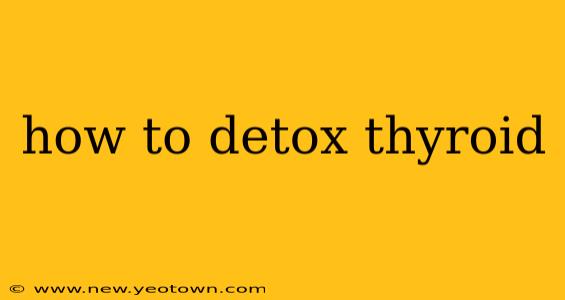The thyroid, a small but mighty gland in your neck, plays a crucial role in regulating your metabolism, energy levels, and overall well-being. When your thyroid isn't functioning optimally, it can lead to a range of symptoms, from fatigue and weight gain to mood swings and digestive issues. While there's no quick fix or "detox" that magically cleanses your thyroid, you can support its health through a holistic approach that focuses on lifestyle changes and dietary adjustments. Think of it less as a detox and more as a comprehensive wellness plan designed to nurture your thyroid.
This isn't about drastic cleanses or extreme measures. It's about making sustainable, positive changes that nourish your body and, in turn, support your thyroid's natural function. This journey is about listening to your body and working with it, not against it.
What Does a "Thyroid Detox" Really Mean?
Before we delve into how to support your thyroid health, let's clarify the term "thyroid detox." There's no scientific basis for a detoxifying cleanse specifically targeting the thyroid. The thyroid, like other organs, doesn't accumulate toxins in the same way that a liver or kidney might. However, many people use the term to refer to holistic approaches that aim to improve overall health and, indirectly, support thyroid function. This usually involves addressing underlying factors that can impact thyroid health.
Identifying Potential Underlying Issues: The First Step
Before focusing on dietary changes or supplements, it’s crucial to rule out any underlying medical conditions affecting your thyroid. Many thyroid problems require medical intervention.
This section will not cover diagnosis or treatment of specific thyroid conditions, only preventative and supportive measures. You must consult with your doctor or endocrinologist for proper diagnosis and treatment.
How to Support Thyroid Health: A Holistic Approach
This approach focuses on several interconnected areas:
1. Nutrition: Fueling Your Thyroid for Optimal Function
What to Include:
- Iodine: Crucial for thyroid hormone production. Find it in seaweed, iodized salt (use sparingly), and some dairy products. However, excessive iodine can also be harmful, so moderation is key.
- Selenium: A powerful antioxidant that supports thyroid hormone metabolism. Good sources include Brazil nuts, tuna, and eggs.
- Zinc: Essential for thyroid hormone synthesis and function. Found in pumpkin seeds, chickpeas, and oysters.
- Foods Rich in Vitamin D: Studies show a link between Vitamin D deficiency and thyroid issues. Sunlight exposure, fatty fish, and eggs are good sources.
- B Vitamins: Support thyroid hormone production and nerve function. Leafy greens, legumes, and whole grains are excellent sources.
What to Limit or Avoid:
- Processed foods: Often high in refined sugars, unhealthy fats, and additives, potentially hindering thyroid function.
- Gluten: Some individuals with thyroid conditions find that eliminating gluten improves their symptoms.
- Cruciferous vegetables (in excess): While generally healthy, large quantities of vegetables like broccoli, cauliflower, and cabbage can interfere with thyroid hormone production in some people (especially those with hypothyroidism). Moderation is key.
- Soy products (in excess): High soy intake might interfere with thyroid hormone absorption in some individuals. Again, moderation is key.
2. Stress Management: The Unsung Thyroid Hero
Chronic stress significantly impacts thyroid function. Effective stress-management techniques are vital.
- Mindfulness and meditation: Help regulate stress hormones.
- Yoga and tai chi: Gentle exercise to promote relaxation and reduce stress.
- Adequate sleep: Essential for overall health and thyroid function. Aim for 7-9 hours of quality sleep each night.
3. Exercise: Movement for Metabolism
Regular physical activity boosts metabolism and supports overall health, indirectly benefiting thyroid function. Aim for at least 30 minutes of moderate-intensity exercise most days of the week.
4. Environmental Toxins: Minimizing Exposure
While you can’t completely eliminate exposure to environmental toxins, you can minimize your contact. This could involve using natural cleaning products and avoiding exposure to excessive pesticides or heavy metals.
Are there specific supplements that can help?
Many individuals find support from supplements, however, it is important to note that supplements should only be taken under the guidance of a healthcare professional. They can assess your individual needs and ensure that any supplementation is safe and appropriate for your situation. Self-treating can be dangerous.
Disclaimer: This information is for educational purposes only and is not a substitute for professional medical advice. Always consult with your doctor or a qualified healthcare professional before making any changes to your diet or treatment plan, especially if you have a pre-existing medical condition. They can help determine the best course of action for your specific situation.

